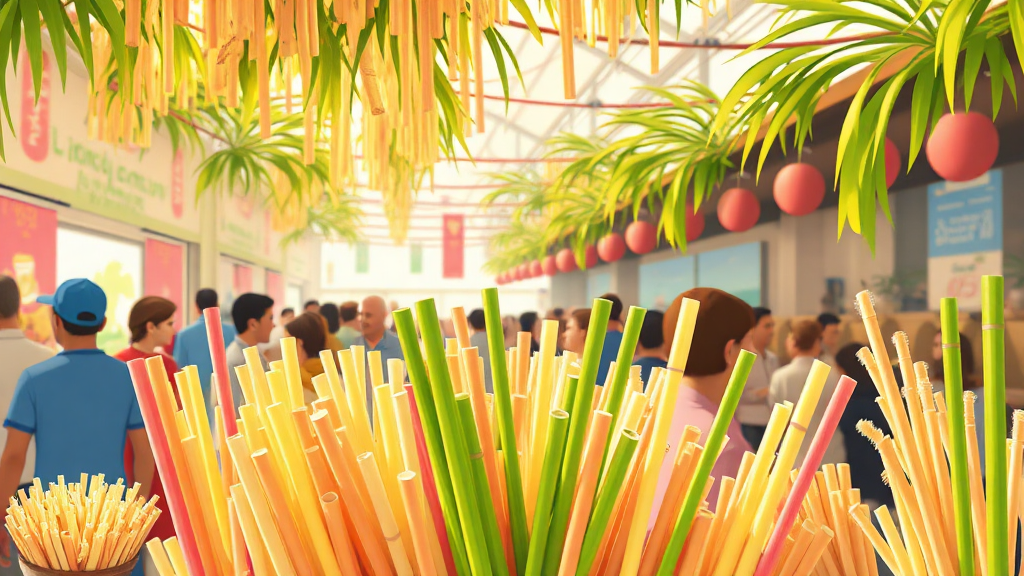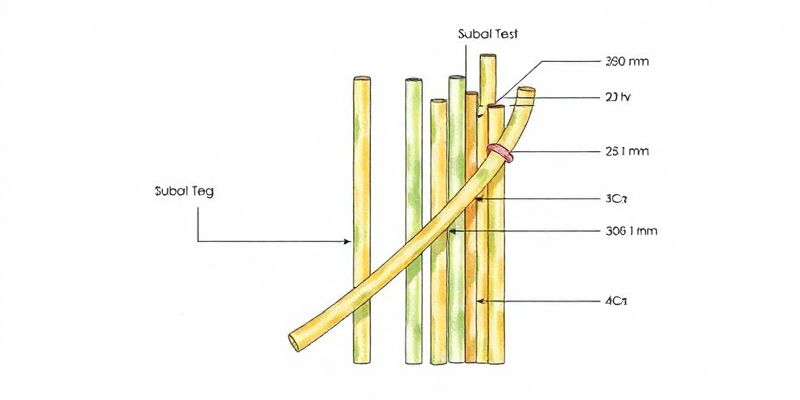Sugarcane Straws: Sustainable, Compliant B2B Solutions for 2025

Introduction: Plastic Bans and Why Sugarcane Straws Are the Future

Imagine this: It’s a busy Friday night at your hotel bar. Guests are ordering cocktails left and right, and your staff is hustling to keep up with demand. Now picture the moment a well-traveled executive from Europe points to the plastic straw in her drink and asks, “Aren’t these banned where you operate?” Talk about an awkward conversation starter.
This scenario is playing out with increasing frequency acros the global hospitality industry. As of 2024, over 127 countries have implemented some form of plastic straw restriction, with penalties ranging from modest fines to staggering six-figure sanctions in places like California and the European Union. The writing on the wall couldn’t be clearer: single-use plastics are on their way out, and businesses need viable alternatives—yesterday.
Enter sugarcane straws—the golden child of sustainable sipping solutions. Unlike their plastic predecessors, these biodegradable beauties are made from bagasse, the fibrous byproduct left after sugarcane juice extraction. What was once considered agricultural waste is now being transformed into a solution for one of our planet’s most persistent pollution problems.
“We switched to sugarcane straws last year, and honestly, I wish we’d done it sooner,” shares Marco Delgado, F&B Director at a luxury Miami hotel chain. “Guests notice and appreciate these details. It’s become part of our sustainability story that actually resonates with our clientele.”
Explore why sugarcane straws are the future of eco-friendly sipping benefits in a world where environmental consciousnes is no longer optional—it’s expected. For bulk buyers acros hotels, restaurants, and event venues, finding compliant alternatives that don’t compromise on quality or guest experience isn’t just good ethics—it’s good busines.
Regulatory Compliance: Certifications for Sugarcane Straws

When it comes to food-contact products like straws, regulatory compliance isn’t a “nice-to-have”—it’s non-negotiable. The landscape of certifications can seem daunting at first glance, but understanding the essentials will set your busines up for succes.
FDA certification stands as the gold standard for food-contact materials in the United States. According to the FDA’s food contact materials guidelines, any material that touches food or beverages must meet strict safety criteria. Similarly, in Europe and parts of Asia, LFGB certification (German Food, Articles of Daily Use and Feed Code) provides assurance that products meet rigorous safety standards.
What does this mean for your busines? According to a 2023 industry survey by Restaurant Busines Magazine, establishments using non-certified straws faced an average of $12,400 in regulatory fines last year alone. That’s an expensive oversight that could have been easily avoided.
“Certification isn’t just about avoiding fines,” explains Sarah Nguyen, Compliance Director at a major hotel supplier. “It’s about customer trust. When guests see you’re using properly certified products, it reinforces that you care about their safety and wellbeing.”
Premium sugarcane straws come with these certifications baked in. They’re designed to meet global standards right out of the box, providing peace of mind for businesses operating acros multiple jurisdictions. Learn more about humidity-resistant sugarcane straws that maintain compliance in challenging environments, a crucial consideration for tropical hospitality businesses where moisture can compromise lesser alternatives.
Как соломинка с сахарным тростником по сравнению с другими альтернативами эко

The sustainable straw market has exploded in recent years, leaving many busines owners wondering which option makes the most sense for their specific needs. Let’s break down how sugarcane straws stack up against the competition:
| Feature | Соломка из сахарного тростника | Бумажные трубочки | PLA Corn Straws | Metal Straws |
|---|---|---|---|---|
| ——— | ————— | ———- | —————– | ———- |
| Долговечность в напитках | 2-3 hours | 20-30 minutes | 1-2 hours | Неопределенный |
| Composting Time | 90 days (home compostable) | 30-60 days | 180+ days (industrial only) | Non-compostable |
| Пользовательский опыт | Natural feel, no taste | Often gets soggy | Похоже на пластик | Temperature conductive |
| Cost per 1000 units | $45-65 | $35-50 | $50-70 | $500-2000 |
| Параметры настройки | Высокий | Середина | Середина | Ограничен |
A comparative analysis by the Food Service Packaging Institute revealed that businesses switching from paper to sugarcane straws reduced customer complaints about straw performance by 78%. That’s a significant improvement in guest experience that directly impacts satisfaction and repeat busines.
“We tried paper straws initially because they were slightly cheaper,” admits Carlos Fernandez, owner of a Miami beach club. “But we were replacing them constantly, sometimes 2-3 times per drink. When we calculated the actual usage, sugarcane straws ended up being more economical while providing a much better customer experience.”
Discover the complete sugarcane straws cost analysis compared to other alternatives to understand the true ROI beyond just purchase price. Remember that in hospitality, customer experience often outweighs minor differences in supply costs.
Верхние Busines Преимущества перехода на соломинки сахарного тростника
Beyond compliance and environmental considerations, sugarcane straws offer tangible busines advantages that directly impact your bottom line:
**Enhanced Brand Perception**: According to a 2024 Nielsen Consumer Report, 73% of global consumers state they would view a hospitality brand more favorably if it used plant-based alternatives to plastic straws. This perception shift translates to real loyalty and word-of-mouth marketing.
**Customization Opportunities**: Unlike many eco-alternatives, sugarcane straws offer excellent customization options. From branded imprints to custom colors, these straws can become an extension of your marketing strategy. Imagine cocktail straws that match your brand colors or carry your logo—small touches that reinforce brand recognition with every sip.
**Operational Efficiency**: The durability of sugarcane straws means les frequent replacement during service, reducing interruptions and improving staff efficiency. Many establishments report 30-40% fewer straw-related service issues after switching from paper alternatives.
**Regulatory Future-Proofing**: With environmental regulations tightening globally, choosing a fully compliant option now prevents costly transitions later. The UNEP’s latest report on plastic alternatives suggests that compostable plant-based materials like sugarcane will likely receive preferential regulatory treatment in coming years.
“We incorporated our logo and ‘Committed to Clean Oceans’ tagline on our sugarcane straws,” shares Jennifer Santos, Marketing Director at a coastal restaurant group. “They’ve become conversation starters and subtle brand ambassadors. Customers actually photograph their drinks with our branded straws and share them on social media—it’s marketing we don’t have to pay for.”
Explore bulk sugarcane straws for conference events and discover how large-scale operations are maximizing these busines benefits through strategic sustainable choices.
Воздействие на окружающую среду: почему выигрывают соломинку сахарного тростника
The environmental case for sugarcane straws extends far beyond simply “not being plastic.” Their full lifecycle offers substantial ecological advantages that resonate with environmentally conscious consumers and sustainability-focused businesses.
According to the Environmental Impact Assessment Journal, the production of sugarcane straws generates 70% les carbon emissions compared to their plastic counterparts. This reduction comes primarily from two factors: utilizing an agricultural byproduct (bagasse) that would otherwise be burned and the carbon sequestration that occurs during sugarcane growth.
When these straws reach their end-of-life, they decompose naturally in home composting conditions within 90 days—without leaving behind microplastics or toxic residues. Compare this to PLA “compostable” straws that require industrial composting facilities (which many regions lack) or paper straws that often contain hidden plastic binders or PFAS chemicals.
“The complete biodegradability of our sugarcane straws became a major selling point when we pitched to eco-certified hotels,” explains Raj Patel, sustainability director at a boutique hotel group. “We can confidently tell guests their straw will return to soil, not linger in landfills or oceans for centuries.”
Check out eco-friendly sugarcane straws for sustainable events to understand how major gatherings are leveraging these environmental benefits as part of their sustainability commitments.
Тематическое исследование: соломинка с сахарным тростником успешна в действии
The Oceanic Resort Group, operating 15 properties acros the Caribbean, implemented a complete switch to sugarcane straws in early 2023. Their challenge: finding an eco-friendly alternative that could withstand tropical humidity while meeting their guests’ expectations for quality and presentation.
After testing multiple sustainable options, they selected custom-branded sugarcane straws for their signature cocktails and standard versions for everyday beverages. The results have been remarkable:
- 97% positive guest feedback on straw performance
- 2.1 metric tons of plastic eliminated annually
- $28,500 saved in potential regulatory penalties
- Featured in Sustainable Travel magazine, generating valuable PR
- 22% increase in positive sustainability-related reviews on travel platforms
“The transition was surprisingly smooth,” notes Elena Rodriguez, Sustainability Director. “We expected some operational challenges, but the sugarcane straws integrated seamlessly into our existing workflows. The biggest surprise was how many guests specifically mentioned and appreciated the change in our feedback surveys.”
The key to their succes? Proper staff training on the environmental benefits and product features, allowing team members to confidently addres guest questions and highlight the resort’s commitment to ocean conservation—a natural talking point for their beachfront properties.
Discover durable, compliant, and customizable sugar cane straws for B2B applications like the Oceanic Resort Group implemented in their successful transition.
Часто задаваемые вопросы
- How do sugarcane straws perform in cold vs. hot beverages?
- Sugarcane straws excel in cold beverages, maintaining their structure for 2-3 hours—perfect for most cocktails and soft drinks. For hot beverages, they’ll perform well for about 45-60 minutes before showing signs of softening. This makes them suitable for most coffee and tea service timeframes, though they’re primarily designed for cold applications.
- What minimum quantities are available for custom-branded sugarcane straws?
- Most suppliers offer custom branding starting at 10,000 units, with better economies of scale at 25,000+ units. This makes custom options viable not just for large chains but also for medium-sized operations or seasonal campaigns. NatureBioEco offers flexible options starting at lower minimums for businesses testing the waters.
- How should sugarcane straws be stored to maintain quality?
- Store sugarcane straws in a cool, dry place away from direct sunlight. While they’re humidity-resistant compared to paper alternatives, extreme moisture can eventually affect performance. No refrigeration is required, and they typically have an 18-24 month shelf life when stored properly.
- Are there different sizes available for various beverage applications?
- Yes! Standard options include regular (8mm diameter) for everyday beverages, jumbo (12mm) for smoothies and thick drinks, cocktail-length (shorter) for bar service, and stirrer-style for coffee stations. Explore eco-friendly cocktail straws for drinks in B2B bulk solutions to find specialized options for your bar program.
- What certifications should I look for when ordering sugarcane straws?
- Priority certifications include FDA compliance (US), LFGB certification (Europe), and home compostability verification. Additional certifications like BPI (Biodegradable Products Institute) provide extra assurance but aren’t strictly necessary if the core certifications are present.
- How do sugarcane straws affect the taste of beverages?
- Unlike paper straws that can impart a papery taste, properly manufactured sugarcane straws are taste-neutral. They don’t contain adhesives or binders that affect flavor, making them ideal for premium cocktails and beverages where taste integrity is paramount.
- What’s the cost difference between standard and custom-branded sugarcane straws?
- Custom branding typically adds 15-20% to the base price, with setup fees ranging from $150-300 depending on design complexity. While this represents an upfront investment, branded straws offer marketing value that standard versions don’t, often justifying the additional cost for customer-facing businesses.







